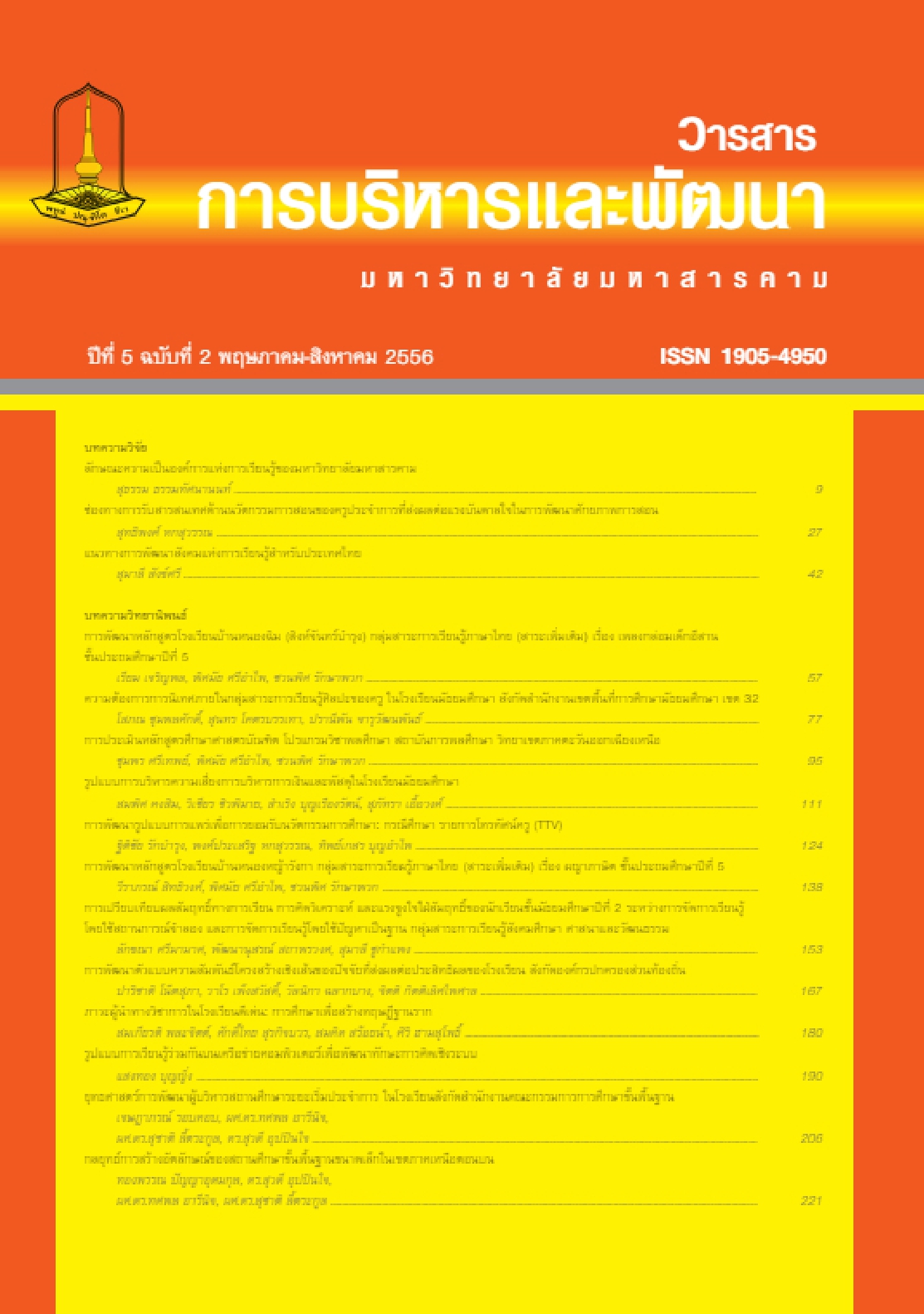A Structural Equation Model of Factors Affecting School Effectiveness Under Local Administration Organizations
Main Article Content
Abstract
The research objectives were to (1) study factors affecting school effectiveness under local administration organizations and the level of school effectiveness; (2) examine the goodness-of-fit of the model of factors affecting school effectiveness under local administration organizations developed by the researcher with the empirical data; and (3) study the direct influence, indirect influence and total influence of factors affecting school effectiveness under local administration organizations. The study was administered into 2 phases: the first phase was determination on the study framework; the second phase comprised a test of hypothesis based on a set of 5-level rating scale questionnaires with the discrimination power of 0.38-0.94 and the reliability coefficient of 0.97. The sample of 630 schools under local administration organizations were obtained using Multi-stage Random Sampling. Statistics used included frequency, percent- age, mean, standard deviation, Pearson’ Product Moment Correlation Coefficients the linear structural equation model and confirmatory factor analysis.
The research finding:1. The factors affecting school effectiveness were instructional leadership, organization’s competency, learning process management, school climate. The school effectiveness was in general at the high level. Considering each factor in detail, this research found that most factors were at the high level except the organization’s competency which was at the average level.
2. The goodness-of-fit test of the model of administrative factors affecting school effectiveness developed by this researcher showed that the model was consistent with the empirical data (Chi-square = 226.11, degree of freedom (df) = 115, P = 0.063, goodness-of-fit index (GFI) = 0.96, adjusted-goodness-of-fit index (AGFI) = 0.91, root mean square error of approximation (RMSEA) = 0.056 and critical number (CN) = 276.52.)
3. The factors that had direct, indirect and total effect on school effective- ness with the path coefficients ranging from large to small respectively as (1) direct effect in 4 factors those were organization’s competency, learning process management, school climate, and instructional leadership. (2) indirect effect in 3 factors those were organization’s competency influencing through learning process management and school climate, instructional leadership influencing through learning process management and school climate, school climate in- fluencing through learning process management, and (3) total influence in 4 factors those were organization’s competency, learning process management, school climate and instructional leadership.
Downloads
Article Details
References
Alig-Mielcarek, M.J. (2003). A model of school success: Instructional leadership, academic press, and student achievement. Dissertation Presented in Partial Fulfillment of the Requirements for the Degree of Doctor of Philosophy in the Graduate School of The Ohio State University.
Anunnavee P. (2002). Factors That Affect The Efficiency of The Primary School Under The Office of The National Primary Education. Thesis Ph.d. (Education), Chonburi: Burapha University.
Chantasorn W. (1996). Improvement and Government Management Reform. Bangkok: Institute of Policy Studies, Association of Social Sciences,Thailand.
Cherngchaow C. and Others. (1998). Analysis of the structure of the elements that affect the performance of the private school to teach Islam in the southern border provinces. Songklanakarin Journal of social science and Humanities, 4 (May -August).
Eberts & Stone. (1988). Factors Affecting School Effectiveness. London: Greenwood Press.
Hallinger, P. & Murphy, J. (1985). Assessing the Instructional Management Behaviors of Principal, Elementary School Journal. 217- 248.
Heneveld, W. & Craig, H. (1995). School Count: World Bank Project Designs and the Quality of Primary Education in Sub – Saharan Africa. Policy Research Working Paper No. WTP 303. Washington DC.: World Bank.
Hoy,W.K,&,C.G. Miskel. (2005). Educational Administration: Theory, Research, and Practice.6th ed. New York: McGraw-Hill.
Miller, S. (2001). Navigating the Recession Through Effective Leadership. Retrieved December 29, 2006, from http:www.entrepreneur.com/ article/04621295548200.html.
Pheng sawasdi W. (2005). Development of a Linear Structure Relations of Effective Leadership of Executive that Affect Efficiency of Primary School Education. Thesis Ph.D. (Education), Khon Kaen: Graduate School Khon Kaen University.
PhiSek P. (2003). Cultural Organizations and Some Factors that Affect Productivities Science- School army. Thesis Ph.d. (Education), Bangkok: Graduate School of Srinakharinwirot University.
Sararattana W. (2005). Executive Professional Development School: 3 dimensions to the Executives Administrators. 5th. Bangkok: Tipwisut.
Skipper, S. (2006).Conceptual Framework for Effective Inclusive Schools, 2006.
Wiwatthananon S. (2006). Factors that Affect Multiple Descriptors Level for Effectiveness of secondary School in Bangkok. Thesis Ph. D. (Education) Nakornratchasima: Graduate School, Vongchavalitkul University.


